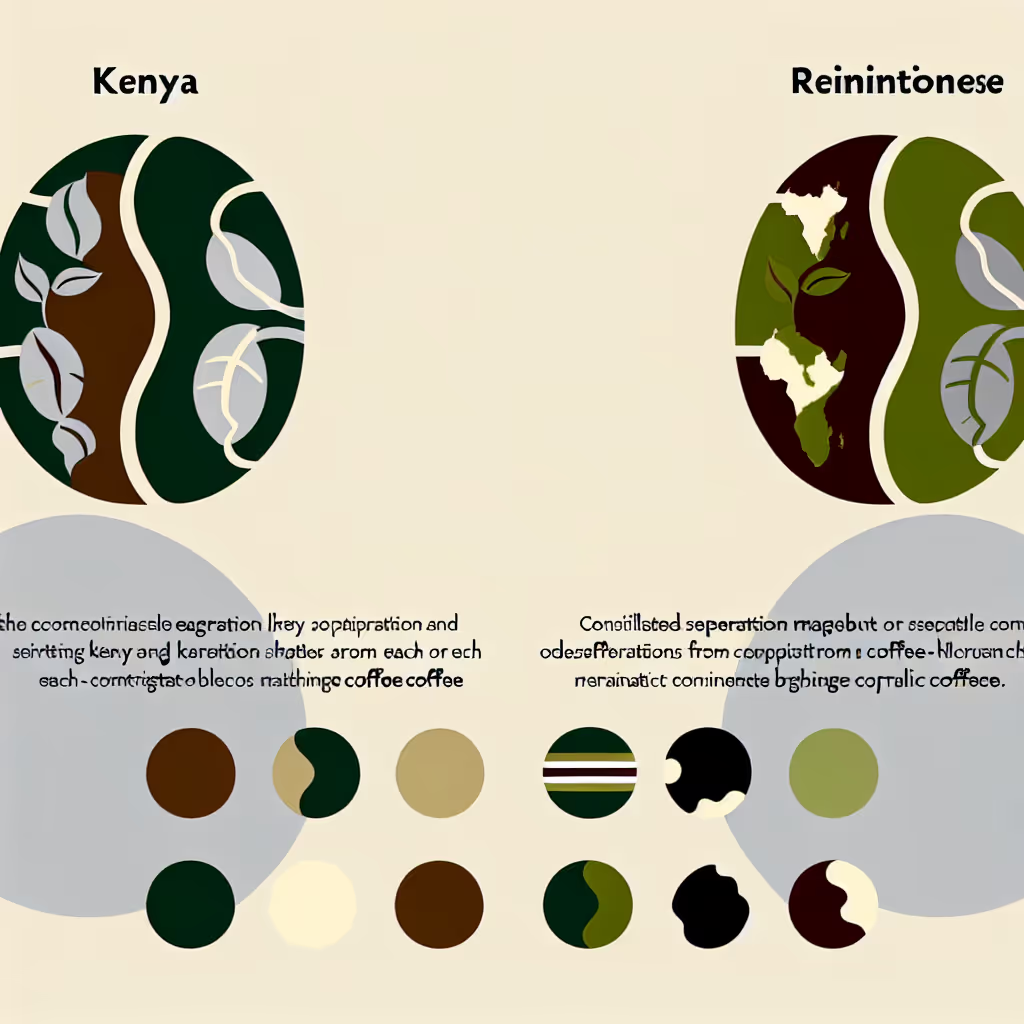Kenyan Vs. Bolivian Coffee
This comparison explores the distinct qualities of Kenyan and Bolivian coffee beans, highlighting their flavor profiles, growing conditions, and brewing methods to help coffee enthusiasts make informed choices.

Brief Description
Kenyan coffee is renowned for its bright acidity, full body, and complex flavor profile. Grown in the rich volcanic soils of the Central Highlands, these beans benefit from ideal climate conditions and meticulous processing. The result is a cup that's bold, wine-like, and often described as the 'connoisseur's choice'. With notes ranging from blackcurrant to citrus, Kenyan coffee offers a truly unique and memorable tasting experience.
Bolivian coffee is a hidden gem in the world of specialty coffee. Grown in the lush Yungas region, these beans benefit from high altitudes and rich volcanic soils. Known for their bright acidity, complex flavor profile, and smooth body, Bolivian coffees often showcase notes of chocolate, citrus, and stone fruits. Despite challenges in production and export, Bolivian coffee is gaining recognition for its unique character and high quality.
Importance of Comparison
Comparing Kenyan and Bolivian coffee is crucial for coffee lovers seeking to expand their palate and explore lesser-known origins. Both regions produce high-quality, single-origin beans with unique characteristics. Understanding the differences in flavor profiles, growing conditions, and processing methods can help consumers find their ideal cup and appreciate the diversity of the coffee world.
Key Attributes
Origin
Kenyan
Bolivian


Consumer Guide
When choosing between Kenyan and Bolivian coffee, consider your flavor preferences. Kenyan coffee offers a bright, wine-like acidity with notes of blackcurrant and citrus, ideal for those who enjoy bold, complex flavors. Bolivian coffee presents a smoother profile with chocolate, citrus, and stone fruit notes, perfect for those seeking a balanced cup. Both origins excel in pour-over and French press brewing methods, but Bolivian beans are also well-suited for espresso. Consider the altitude and processing methods: Kenyan beans are typically grown at slightly higher elevations and often undergo double fermentation, while Bolivian beans offer more variety in processing, including natural and honey methods. Lastly, factor in availability – Kenyan coffee is more widely produced and may be easier to find than the rarer Bolivian beans.
Expert Opinions
Coffee expert Maria Rodriguez notes, 'Kenyan coffee is often considered the pinnacle of brightness and complexity, while Bolivian coffee is an emerging star with its balanced profile.' Roaster John Smith adds, 'The double fermentation process used in Kenya contributes to its distinctive flavor, whereas the varied processing methods in Bolivia offer a wider range of taste experiences.' Both experts agree that these origins represent some of the finest single-origin coffees available, each with its unique appeal to different palates.
FAQs
Kenyan coffee is known for its bright acidity, full body, and complex flavors of blackcurrant, citrus, and floral notes. Bolivian coffee offers a smoother profile with chocolate, citrus, and stone fruit notes, typically with a lighter body and more balanced acidity.
Kenyan coffee is grown in the Central Highlands at altitudes of 1400-2100m in volcanic soils. Bolivian coffee is cultivated in the Yungas region at similar altitudes (1200-2100m), also benefiting from volcanic soils. Both regions provide ideal conditions for high-quality coffee production.
Both Kenyan and Bolivian coffees excel in pour-over and French press methods, which highlight their unique flavor profiles. Additionally, Kenyan coffee is often enjoyed as a cold brew, while Bolivian beans are well-suited for espresso preparation.
Kenyan coffee typically undergoes washed processing with a unique double fermentation method, followed by sun-drying. Bolivian coffee offers more variety in processing, including washed, natural, and honey methods, allowing for a wider range of flavor profiles.
Kenya produces significantly more coffee annually, with approximately 50,000 metric tons compared to Bolivia's 25,000 metric tons. This difference in production volume can affect availability and pricing of these single-origin coffees.
Kenyan coffees are generally more widely available in the specialty coffee market due to higher production volumes and established export channels. Bolivian coffees, while gaining recognition, may be harder to find but offer a unique tasting experience for those willing to seek them out.
Conclusion
Both Kenyan and Bolivian coffees offer exceptional quality and unique flavor profiles that cater to different preferences. Kenyan coffee stands out for its bright acidity, full body, and complex flavors, making it a favorite among those who enjoy bold, wine-like cups. Bolivian coffee, with its smoother profile and balanced flavors, appeals to those seeking a more nuanced experience. While Kenyan coffee may be more readily available, the emerging Bolivian coffee scene presents an exciting opportunity for coffee enthusiasts to explore new tastes. Ultimately, the choice between these two origins comes down to personal preference and the desire to experience the diverse world of single-origin coffees.






